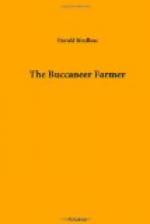In the meantime, he looked about gloomily. The weather had changed, a moist west wind drove heavy clouds across the sky and the fell-tops were hidden by mist. It threatened a wet hay-time and hay was scarce in the dale, where they generally cut it late after feeding sheep on the meadows. Osborn farmed some of his land and had hoped for a good crop, which he needed. The grass in the big meadow by the beck was long and getting ripe, but the red sorrel that grew among it had lost its bright color. The filling heads rolled in waves before the wind, but there was something dull and lifeless in the noise they made, and Osborn knew what this meant. Rain was coming and when rain began in the dale it did not stop.
His glance rested on the green embankment along the beck. His father had made the dyke at a heavy cost but in places the stones and soil had gradually washed away. If the dyke broke at one spot, the beck would return to its old channel and much damage might be done, particularly if the floods rolled across the turnip fields. Osborn had meant to strengthen the dyke, but had put it off because of the expense.
A little later Hayes came up the steps. Osborn did not ask him to sit down, although there was room on the stone bench, and the agent leaned against the terrace wall. His face was inscrutable but he remarked his employer’s rudeness.
“I have seen Fisher and he is willing to take a mortgage on Ryecote,” he said. “The interest is higher than I thought, but the money would pay off urgent bills and cover the cost of the farmstead repairs.”
“How much does Fisher want?” Osborn asked and frowned when he was told. “It’s unjust; two per cent above the proper interest.”
“I can’t borrow for less. However, if we use the money judiciously, we ought to get something back by higher rents. Lang and Grey, for example, would pay a little more for the improvements they require.”
Osborn pondered. He was in a suspicious mood and thought Hayes wanted to negotiate the mortgage.
“When I have satisfied the other tenants there won’t be much left for Lang and Grey,” he rejoined. “My experience is that the money you sink in improvements is gone for good.”
“They must be made, for all that; particularly just now when a dissatisfied spirit is spreading among the farmers. Askew is showing them what can be done by the proper use of capital.”
“Askew!” Osborn exclaimed. “Father and son, the Askews have been the origin of the worst trouble I’ve had.”
Hayes was willing to indulge Osborn’s rancor and derived a rather malicious satisfaction from seeing him annoyed. Besides, he did not want to dwell upon the mortgage.
“I wonder whether you know Askew has bought Drysdale’s sheep?”
“I did not know. I sold the flock to Graham.”
“Then Askew must have bought them soon afterwards, unless he sent Graham to make the deal with you.”




